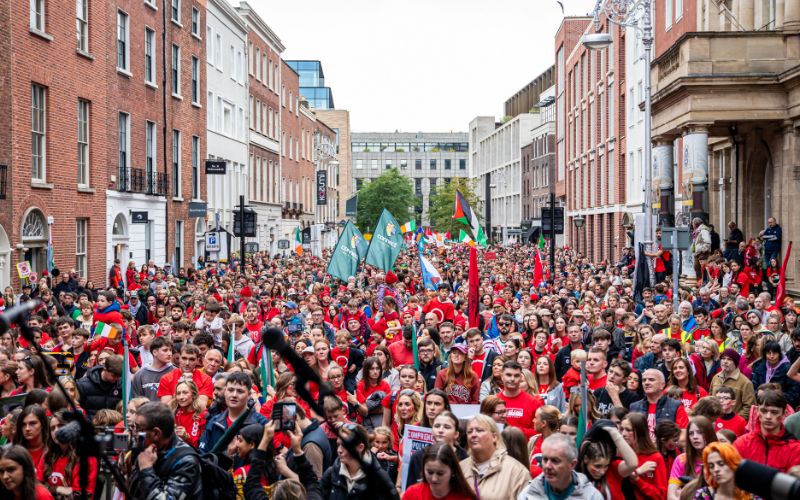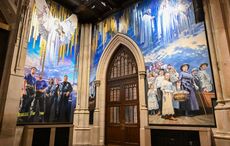How many Irish composers do you know? Aficionados of Irish classical and folk music will of course know of many. Outside of this, the average music lover's knowledge of Irish composers is likely limited to a handful of compositions.
Ireland is a land of Nobel prize-winning writers, platinum-selling pop stars and numerous Oscar winners. Few countries the size of Ireland have made such an impact on the arts. Ireland's classical and folk composers have also achieved great things; however, few are household names like Beckett, Binchy or Bono.
Consider for a moment, how many Irish composers do you know? You may be aware of Turlough O'Carolan's harp music, John Field's piano Nocturnes and of course Bill Whelan's "Riverdance". In the grand scheme, these pieces are but footnotes in the history of music. Don't believe me? The proof lies in the numerous books and articles about 'great' composers.
Wendy Thompson's beautifully presented 2001 publication "The Illustrated Book of Great Composers" aims to provide a basic introduction to 100 great composers. Not a single Irish composer is among the 100 'greats'.
John Field is mentioned purely for his influence on Chopin. The Dublin-born Stanford is erroneously identified as English and mentioned briefly, not for his music, but his teaching influence on English composers.
People of influence have rarely placed Irish composers in the public consciousness. The one exception is Bill Whelan, whose "Riverdance" theme is perhaps the only Irish orchestral composition that is known the world over. How different might it be to adopt the attitudes towards composers found in mainland Europe and America?
In 2019, on a trip to Vienna, I could not but help notice the cultural cache attached to composers. Streets, museums and cafes are named after composers. Magnificent statues of composers are commonplace, particularly in the Stadtpark. Tacky Mozart souvenirs are as common in Vienna as tacky Leprechaun souvenirs are in Dublin. What does that tell tourists about Ireland's culture? Do we value fictional sprites more than our composers?!
Read more
Tourists come to Ireland for music as much as they go to Vienna for it, yet the public hardly knows anything about the people who compose Irish folk and classical music. They might be forgiven for assuming it was all composed by Leprechauns!
This lack of visibility for Irish composers is something that composer and activist Raymond Deane described sardonically as the composer's 'honor of non-existence' in Irish society. Some, like Turlough O'Carolan, Sean O'Riada, Bill Whelan and Shaun Davey, have at least some kind of significant public recognition, but the wider world knows little of them beyond one or two works.
There are no statues to any of them in Dublin! Granted there are statues of O'Riada and O'Carolan in Ireland, but they are neatly tucked away in the remote villages of Cul Aodha, Cork and Mohill, Leitrim. At least those villagers cherish the achievements of their native composers.
But what of Ireland's other composers? There are many more for Irish people to be proud of.
Here are but nine to begin with.
Michael William Balfe (1808-1870)
Would you be surprised to know one of the great opera composers of the 19th century was born in Dublin? Michael William Balfe achieved phenomenal success in his own lifetime, particularly with his opera "The Bohemian Girl" which had hundreds of performances in the most prestigious opera houses around the world.
There are beautiful statues to Balfe in London's Drury Lane and Paris' Theatre Royal, yet none in Ireland! Though he was world-famous in his time and composed no less than 29 operas, 250 years after his death Ireland's most renowned opera composer is practically unknown in his own country. Should we not laud Balfe's legacy as Italians venerate Verdi, Puccini and Bellini?
Charles Villiers Stanford (1852-1924)
How proud of your Irishness might you feel if you learned in school about a Dublin-born composer who was one of the most honored composers at the turn of the 19th century? Might you be curious to hear his acclaimed 'Irish' symphony that was conducted by Gustav Mahler in New York? Alas, Charles Villiers Stanford is now a peripheral figure in Irish culture, only occasionally programmed in classical concerts.
Students of classical music may learn something of Stanford, however, few know about his vast output of 7 symphonies, 13 concertos, 8 string quartets and numerous other works. 2024 marks the centenary of his death, perhaps it's time for the State to start raising awareness about Stanford, before staging major celebrations of his work in 2024.
Read more
Ina Boyle (1889-1967)
Imagine, if you will, an Irish woman in the 1920s traveling regularly from her countryside Irish home to London to receive tuition from one of the most famous composers of the day? Now, envisage this young lady blossoming into an award-winning composer, published by London's main music publishers. Might you think this is some kind of strange fantasy? Well, it is not!
Ina Boyle did exactly that in the early 20th century, but her music languishes largely unappreciated. She studied with the world-famous English composer Ralph Vaughan-Williams, was honored with a Carnegie award and by the Olympic Cultural Activities Commission. Yes, an Irish Olympic composer! She composed symphonies, ballets and an opera. Her music is proudly Irish and composed with great skill. Listen to her 2nd "Symphony Glencree" to sample her imaginative music.
Ed Reavy (1897-1988)
Whilst Ireland's classical composers have suffered what Raymond Deane begrudgingly described as 'the honor of non-existence', composers of Irish traditional music are even more ostracised. This perhaps is a case of the famous Irish modesty afflicting almost every composer of Irish tunes since O'Carolan passed away in 1735.
A habit of Irish musicians was to say they got a tune from the fairies rather than take credit for composing it themselves. Often people don't know who composed the music they are playing because they simply picked it up by ear from a pub session. There seems to be part of the Irish psyche that likes to believe this music came from the fairies rather than sophisticated human minds.
Ed Reavy came along and changed the course of Irish music history. He was the first composer of Irish traditional tunes to have a collection of his own music published while he was still alive. His tunes flowed from his fiddle out into the wider world of traditional music, to the point that his music is now played by nearly every person who learns how to play Irish traditional music. The fact is though, Reavy and other 20th-century traditional music composers were innovators who built upon the Irish folk tradition with new approaches to tune composition.
Reavy was perhaps the first to really make a mark since O'Carolan. He literally changed the course of Irish music. For that, surely his name should be a legend all around Ireland and Irish America. Born in Cavan, He lived most of his life in Philadelphia.
Paddy Fahey (1916-2019)
Reavy's natural successor, Paddy Fahey, is my own favorite Irish composer. He passed away in 2019 aged 102. A reclusive legend, he rarely made public appearances, never made commercial recordings and never published his music. Thus, it's extraordinary that his compositions are, like Reavy's, played everywhere Irish traditional music is heard.
Practically all the great trad musicians of the past 50 years have recorded his tunes. His music meandered from the sessions in his local East Galway bar into the hands and ears of countless musicians and by now they are heard regularly in sessions from Tokyo to Moscow, London to New York. His music possesses a haunting, yearning quality suited more for listening than dancing.
I recorded 20 of his tunes on a guitar album in 2009, which is perhaps the closest thing there is to a commercially released collection of his music. The only way to hear Fahey himself playing his tunes is to seek out old tape recordings, some of which are in the library of the University of Limerick, as part of an MA Thesis about him, written by Maria Holohan.
Fahey is a music hero to many people and was named the first-ever TG4 Composer of the Year in 2004. Upon receiving the award, he appeared on national TV for the first and only time, playing some of his tunes with two of his biggest advocates, The Kane Sisters. He is at least recognized for his genius within the tradition, but the wider world knows nothing of him. Hopefully, it won't be long before this changes.
Read more
Josephine Keegan (b. 1935)
Wouldn't you be astonished to learn there is a lady in her 80s who has published a four-volume collection of her original compositions, many of which are played regularly by traditional Irish musicians around the world? Might you wonder why you had never heard of her great achievements? Josephine Keegan may not be a household name; however, she is well known in traditional music circles.
A Gold medallist at the Feis Ceoil competition in Dublin, years later she was honored as the 2005 TG4 Composer of the Year. She has recorded five fiddle albums where she accompanied herself on piano.
Keegan perhaps lived in the shadow of the legendary fiddler Sean Maguire, whom she accompanied on the piano around the world. Truth be told though; Keegan's achievements outstrip Maguire. She is one of the most prolific and respected composers of traditional Irish music and for that she deserves much wider recognition.
Eric Sweeney (1948-2020)
When I first met Eric Sweeney, in the early 2000s, I must admit I was mystified. There was an Irish composer who had happened upon an original and accessible style of Irish minimalist music, who was Head of Music at Waterford Institute of Technology, who was a kind and charming man, yet he wasn't nationally famous. His music was scarcely heard on the radio and rarely programmed by orchestras, groups or soloists.
Had he been American, I'm sure he would be internationally famous, as Americans have a very positive habit of really advocating for their best contemporary composers, especially those who compose tonal music, as Eric largely did. Eric Sweeney passed away in 2020 aged 72.
I only met Eric few times, however when I heard of his passing, I simply got angry. He died without achieving the international recognition his life's work richly deserved.
Don't get me wrong, he had a very distinguished career and his education work had a very positive effect on many young musicians, however, his achievements as a composer remained tragically undervalued. His media obituaries were the most significant publicity I've ever seen about Eric. Why does the Irish media wait until composers are dead before they make them newsworthy?
Linda Buckley (b. 1979)
Believe it or not, there is a young composer from Cork whose music has been universally praised as “exquisite” (Gramophone) "strange and beautiful" (Boston Globe) and “glacially majestic” (RTÉ Ten).
She has a PhD from Trinity College Dublin, lectures in Glasgow's Royal Conservatoire of Music and Drama, was RTE Composer-in-Residence, and is one of the few Irish composers to have had their music performed by the renowned BBC Symphony Orchestra. The work they performed 'Chiyo' is a beautiful, ethereal 21st Century orchestral masterpiece.
A composer of extraordinary gifts, Linda Buckley's list of achievements would make anyone sit up and notice. She is but one of several award-winning composers of her generation who could achieve so much more if they were given the kind of media and state support their work undoubtedly merits. A living Irish artist worth championing to the world!
Read more
Niwel Tsumbu (b. 1982)
What if I were to tell you one of the greatest guitarists in the world today was an Irish citizen born in DR Congo? Well, the wider world doesn't know it yet, but Niwel Tsumbu is the most uniquely gifted guitarist you are likely to see. He can play any style he tries, and he's tried many, jazz, flamenco, opera, modern classical, pop and numerous styles from Africa.
He is also a truly unique composer, as heard on his albums S'All Vibration, Songs of the Nations and The Arts of the Duo. He played on the Grammy-winning album They’re Calling Me Home by Rhiannon Giddens and Francesco Turrisi, so hopefully this propels him into the wider recognition he deserves.
While I'm at it, I might as well give my own work a plug. Please visit www.daveflynn.com for more info about my work, which bridges the folk and classical traditions of Ireland.
Avant-Garde addendum
The composers I've selected are/were innovative, however, their music might not be considered 'avant-garde'. The intention of this article is to try to do something to raise the status of Irish composers in society, therefore I selected composers whose music might appeal outside of the niche world of avant-garde music.
It is important to acknowledge that there are a large number of award-winning avant-garde Irish composers. If your taste lies more with the avant-garde, I recommend looking up Ireland's Contemporary Music Centre, Irish Composers' Collective, Crash Ensemble and Concorde ensemble for pointers towards Irish composers making waves in the avant-garde.
* Originally published in 2023, updated in 2025.
This article was submitted to the IrishCentral contributors network by a member of the global Irish community. To become an IrishCentral contributor click here.




Comments